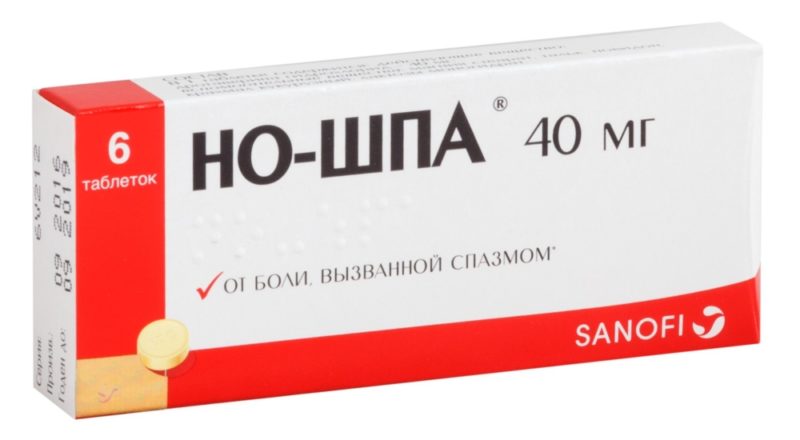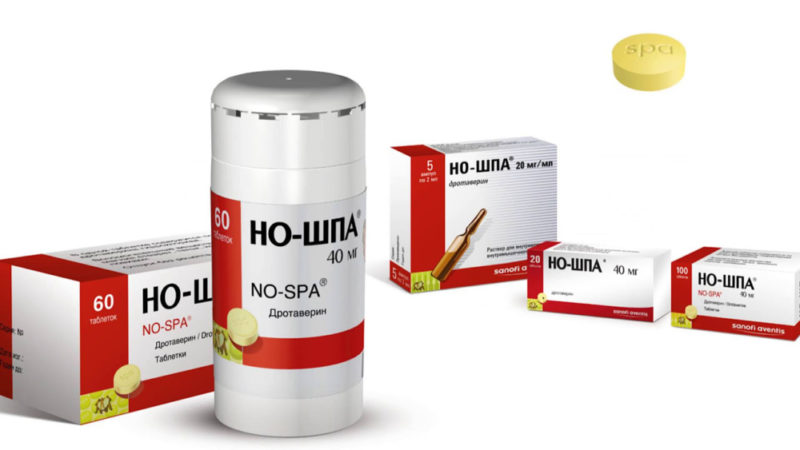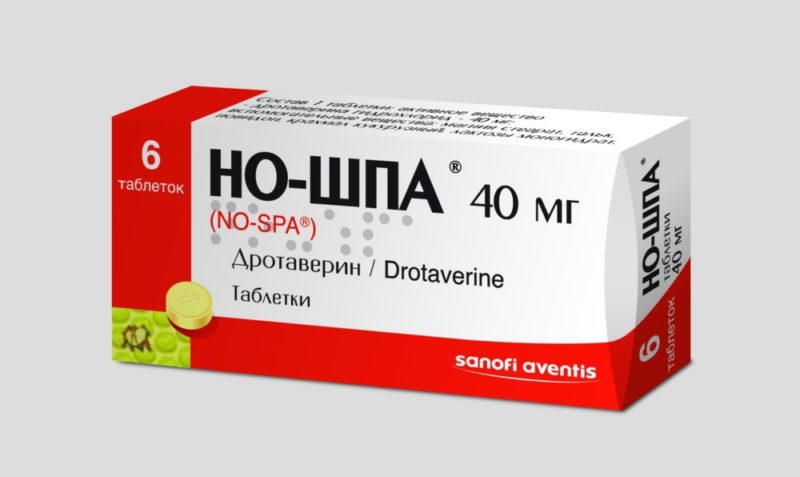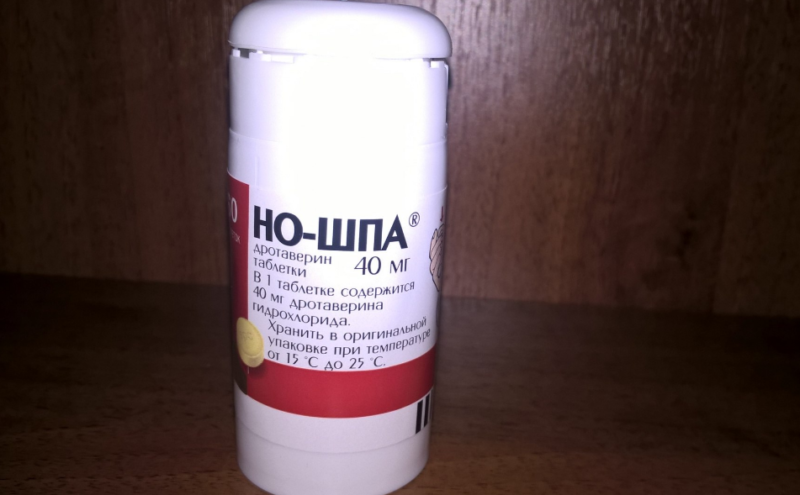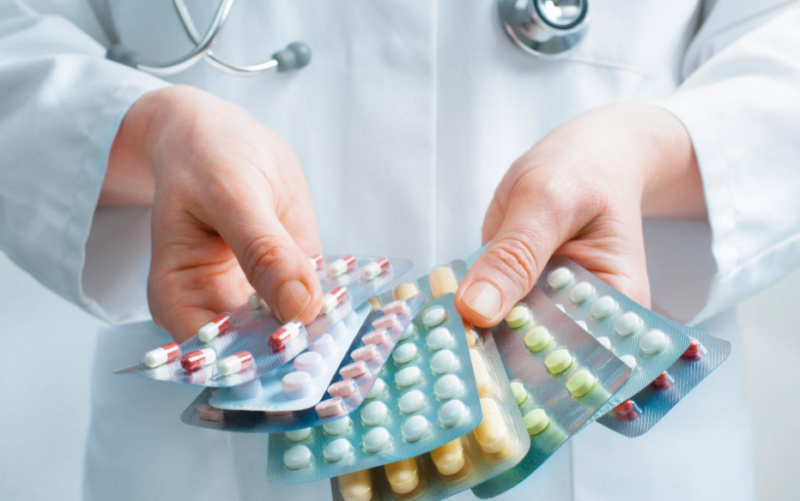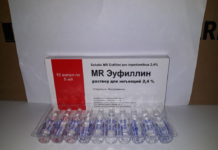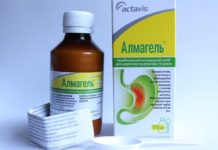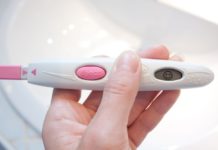“No-Shpa” is the most famous antispasmodic, which helps with pains of various nature. The main active substance in it is drotaverine. The main course of action is relaxation of smooth muscles and vasodilation. As a result of taking the drug, blood flow to all internal organs increases. During pregnancy, No-Shpa is prescribed when uterine hypertonicity occurs.
Material Content:
- 1 Is it possible to take No-Shpa in 1, 2, 3 trimesters
- 2 Forms of release and composition of the drug
- 3 In which cases a drug is prescribed
- 4 Instructions for use at different stages of pregnancy
- 5 The effect of No-Shpa on the fetus
- 6 Drug interaction
- 7 Contraindications, side effects and overdose
- 8 How to replace the drug
Is it possible to take No-Shpa in 1, 2, 3 trimesters
The active substance of the drug is considered relatively safe, is fully absorbed into the blood, processed by the liver and removed from the body in a day. However, pregnancy is a specific condition in which even the most harmless drugs can be harmful. So is it possible to drink No-Shpu during gestation?
- 1 trimester. In the early stages of pregnancy, discomfort in the lower abdomen may be felt. This symptom is caused by changes in the female body and is short-term in nature. However, experts recommend that you have a No-Shpy package with you for safety reasons. The medicine has a stabilizing and antispasmodic effect, relaxing smooth muscles and reducing their mobility, and also dilates blood vessels, improving blood circulation.
Regular administration of the drug is prescribed if there is a risk of abortion due to the strong tone of the uterus.
- 2 trimester.For certain medical conditions in the 2nd trimester, the administration of this medication is also acceptable. It eliminates pain on the side and lower abdomen, and also helps to cope with headaches. But despite the safety, No-Shpa is still a medicine, so its administration should be coordinated with the doctor observing the pregnancy.
- 3 trimester. In the later stages of gestation, the drug is often used to reduce “training” contractions, if they are very pronounced. Starting from week 39, “No-Shpu” is not recommended. Muscle relaxation after the onset of labor can cause intrauterine bleeding.
Forms of release and composition of the drug
The medicine is available in the form of round yellow tablets. One tablet includes 40 g of drotaverine hydrochloride.
Auxiliary elements include: povidone, magnesium stearate, lactose monohydrate.
A standard blister may include 6, 10, and 20 tablets. 60 and 100 pieces are contained in a polypropylene bottle equipped with a piece dispenser.
The oral solution is a clear liquid with a slight yellow-green tint. In one ampoule there is 40 mg of drotaverin, as well as water, ethanol, sodium disulfide.
In which cases a drug is prescribed
Reception "No-Shpa" during pregnancy in the early stages is indicated for:
- threatened miscarriage;
- intense headaches;
- digestive system diseases;
- liver diseases;
- discomfort in the abdomen in the form of cramping or pulling pains;
- pathologies of the biliary tract.
Dosage can only be set by a doctor, the requirements of which are mandatory.
Negative toxic effects of the antispasmodic on the fetus have not been identified. However, Western experts have suggested that its uncontrolled use during the bearing of a child affects the development of speech of a grown up baby. This theory has not yet received experimental confirmation.
Instructions for use at different stages of pregnancy
- In the first trimester, the main risk is due to a possible termination of pregnancy. During this period, having felt prolonged pain in the lower abdomen, you should immediately call an ambulance and take 2 No-Shpa tablets, which will relieve spasm, relieving the condition. After eliminating the unpleasant symptom, you should still visit your doctor for a full examination.
- In the second trimester, a medicine can be taken only as directed by a doctor. At this stage, the danger lies in the occurrence of premature birth. Therefore, any discomfort and pain should be reported to your doctor.
- The third trimester is notable for the appearance of “training” fights. They do not carry a special threat, only delivering unpleasant sensations. The final verdict on their safety will be made by the doctor after the examination. "No-Shpa" will relieve cramping with tonus of the uterus without harm to the child.
The ability of the drug to dilate blood vessels makes its intake unacceptable from 39 weeks. A similar effect can cause bleeding during childbirth. In this case, contractions are suppressed, and labor activity is reduced.
Sometimes tablets do not cope with the task or are contraindicated. In this case, injections are used intramuscularly and intravenously.
Among these circumstances:
- intolerance to lactose present in tablets;
- a high probability of premature birth or miscarriage;
- the need for additional stimulation of cervical dilatation;
- fetal oxygen starvation.
This procedure is carried out in a hospital, where it is possible for doctors to constantly monitor the condition of the pregnant woman. These measures are necessary, since in this form the drug can provoke an allergic reaction or other side effects. Also, injections of No-Shpa sometimes lead to the formation of infiltrates - painful seals from the blood and lymph. They dissolve for more than a month.
The effect of No-Shpa on the fetus
Studies have confirmed that the medication does not adversely affect the embryo, affecting only the mother's body. However, the active substance of the drug enters the baby’s blood through the umbilical cord.
In Hungary, doctors prescribed No-Shpu to pregnant women whose tachycardia was found in their babies. After a course of injections, normal heart rate in children was restored.
Drug interaction
Joint administration of No-Shpy can reduce the anti-Parkinsonian effect of Levodopa. It enhances the effect of antispasmodics such as bendazole and papaverine. No-Shpa also stimulates the effects of procainamide, quinidine, and tricyclic antidepressants, which help lower blood pressure.
The medication suppresses the spasmogenic effect produced by morphine.
In turn, phenobarbital, combined with No-Shpa, increases the effect of drotaverine.
Contraindications, side effects and overdose
Taking medication is prohibited in the following cases:
- in severe liver, heart and kidney failure;
- with AV blockade II, III degree;
- with intolerance to the components of the drug;
- with arterial hypotension;
- if there is a deficiency of lactose, galactosemia (since the No-Shpa tablets contain lactose).
In ampoules, the drug is contraindicated for people with asthma and allergies. This is due to the presence in the solution of bisulfite, often causing a severe allergic reaction.
Special instructions apply to:
- children under 6 years old;
- pregnant and lactating mothers;
- people with coronary artery atherosclerosis;
- patients with prostatic hyperplasia.
In all these cases, No-Shpa is accepted only after the approval of a specialist and provided that the expected benefit prevails over the possible harm.
Side effects are quite rare.
These include:
- sleep disturbance, possible dizziness;
- nausea and vomiting;
- constipation
- a sharp decrease in pressure;
- increased heart rate;
- allergic manifestations to individual substances in the composition of the drug.
An overdose of the drug poses a direct threat to pregnancy. The most dangerous thing is when it happens as a result of intravenous administration of the drug.
Commonly observed:
- pressure reduction;
- arrhythmia;
- oppression of the respiratory centers.
In severe cases, atrioventricular block may develop.
How to replace the drug
"No-Shpu" can be replaced by a number of other antispasmodics containing identical substances. You can find analogues in the categories and budget funds, and more expensive options.
Expensive drugs:
- "Spakovin";
- "Spazmonet";
- Ple Spa;
- "Spazoverin."
Preparations are made on advanced foreign-made equipment.
The cheapest substitute is Drotaverinum (myotropic antispasmodic). This is a domestic medicine, characterized by low cost. It is identical in composition and action to No-Shpe.
In any case, the replacement requires the consultation of the specialist who prescribed the drug. Only he can replace the medicine with its analogue, based on the individual characteristics of the patient.
No-Shpa is considered a safe antispasmodic, one of the few medications that are allowed for women to take while carrying a baby. But even when using it, care should be taken, follow the doctor's instructions and carefully monitor the dosage.


